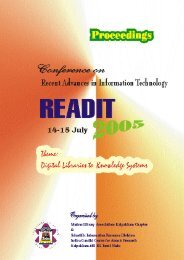READIT-2007 - Indira Gandhi Centre for Atomic Research
READIT-2007 - Indira Gandhi Centre for Atomic Research
READIT-2007 - Indira Gandhi Centre for Atomic Research
Create successful ePaper yourself
Turn your PDF publications into a flip-book with our unique Google optimized e-Paper software.
Knowledge Management may be defined as a process of creating, storing,<br />
sharing and re-using organizational knowledge (Know – How) to enable an<br />
organization to achieve its goal and objectives.<br />
Organizations actually go about acquiring, sharing and creating new<br />
knowledge. The various interpretations of KM are given below to have a better<br />
understanding of its organizational impact:<br />
• It is the process of collecting, organizing, classifying and disseminating in<strong>for</strong>mation<br />
throughout an organization, so as to make it purposeful to those who need it.<br />
• It refers to policies, procedures and technologies employed <strong>for</strong> operating a<br />
continuously updated linked pair of networked databases.<br />
• It aims to capture the knowledge that employees really need in a Central repository<br />
and filter out the surplus.<br />
• It is a means of ensuring a complete development and implementation environment<br />
designed <strong>for</strong> use in specific function requiring expert system support.<br />
• It concerns organizing and analyzing in<strong>for</strong>mation in a computer databases. This<br />
knowledge can be readily shared throughout the organization.<br />
• It involves identification of categories of knowledge needed to support the overall<br />
library activities.<br />
• It combines indexing, searching and push technology to help libraries in organizing<br />
data stored in multiple sources and deliver only relevant in<strong>for</strong>mation to users.<br />
• It, in general, tries to organize and make available important know how wherever and<br />
whenever it’s needed.<br />
• It involves mapping knowledge and in<strong>for</strong>mation resources both online and off line;<br />
training; guiding and equipping users with knowledge access tools and monitoring<br />
outside news and in<strong>for</strong>mation.<br />
• It incorporates intelligent searching, categorization and accessing of data from<br />
disparate databases, e-mail and files.<br />
• It involves understanding the relationships of data; identifying and documenting rules<br />
<strong>for</strong> mapping data; and assuring that data are accurate and maintain integrity.<br />
• It helps in facilitation of autonomous coordination of decentralized subsystems that<br />
can state and adapt their own objectives.<br />
EVOLUTION OF KNOWLEDGE MANAGEMENT (KM)<br />
Dr. Ranganathan was the first person who abruptly marked that Universe of<br />
subjects is synonymous to Universe of Knowledge and he had proposed the concept<br />
of knowledge management explicitly. Knowledge Management is an approach <strong>for</strong><br />
addressing the in<strong>for</strong>mation overload that has evolved over the last few years. The<br />
importance of knowledge has been recognized from the very first day of mankind<br />
evolution; however the systematic study of knowledge as a management and scientific<br />
discipline began during 1990s. A holistic view considers knowledge to be present in<br />
ideas, judgments, talents, root causes, relationships, perspectives and concepts.<br />
Knowledge is stored in the individual brain or encoded in organizational processes,<br />
documents, products, services, facilities and systems. The table given below<br />
153

















